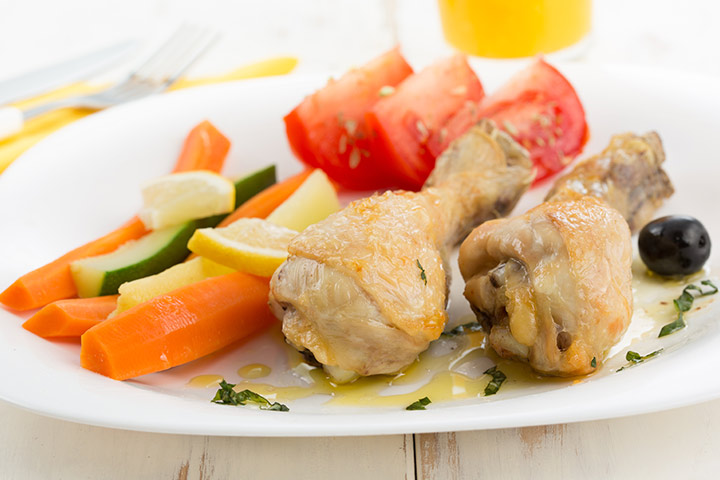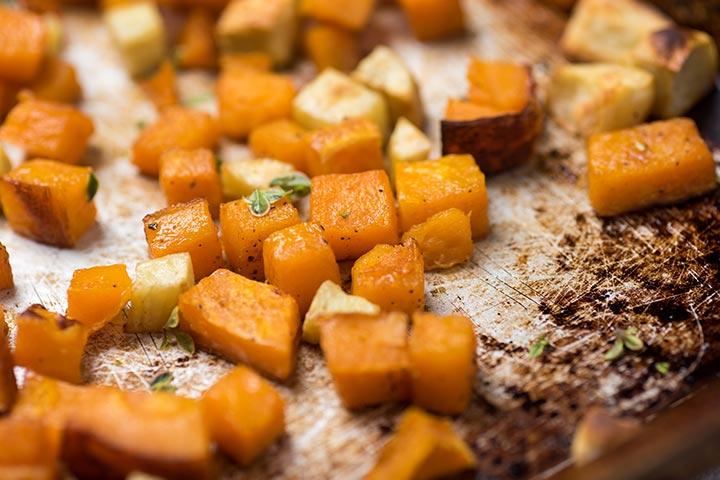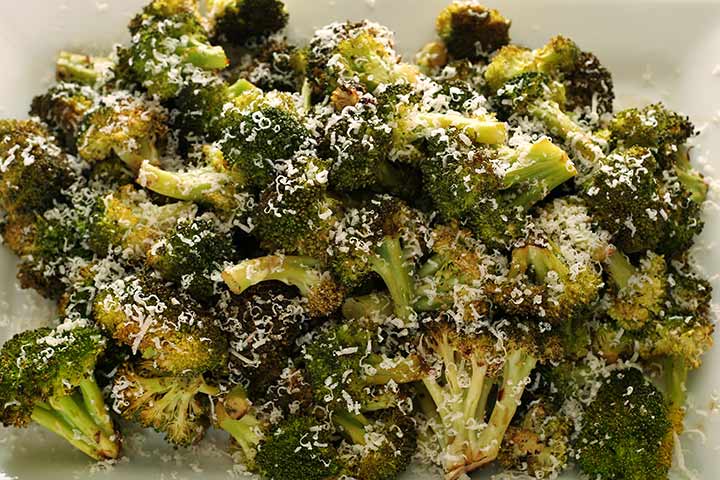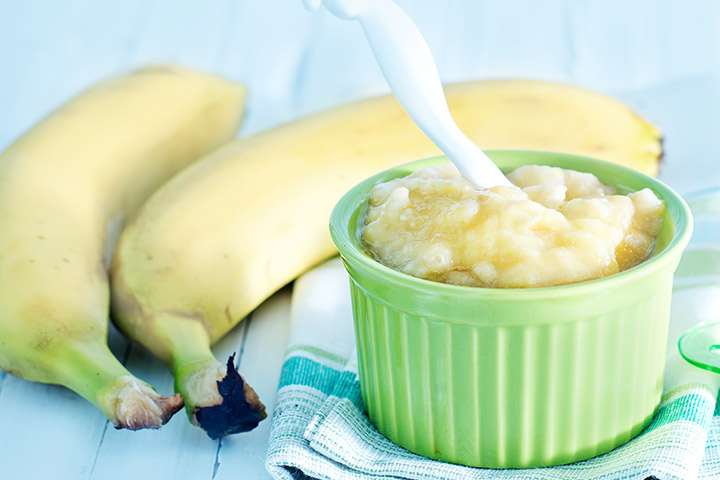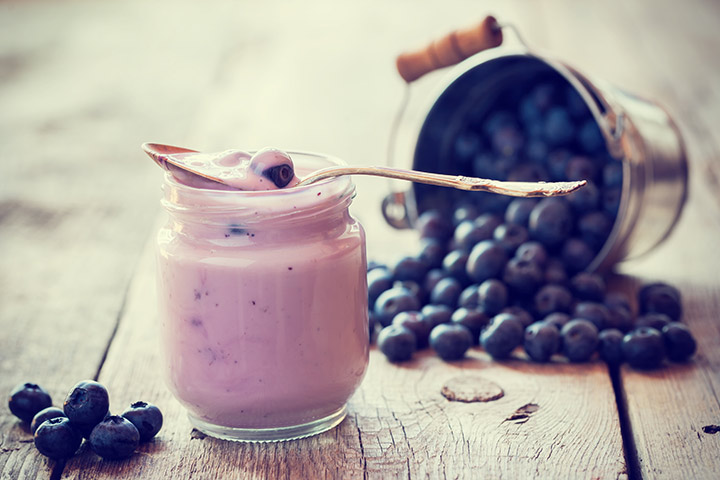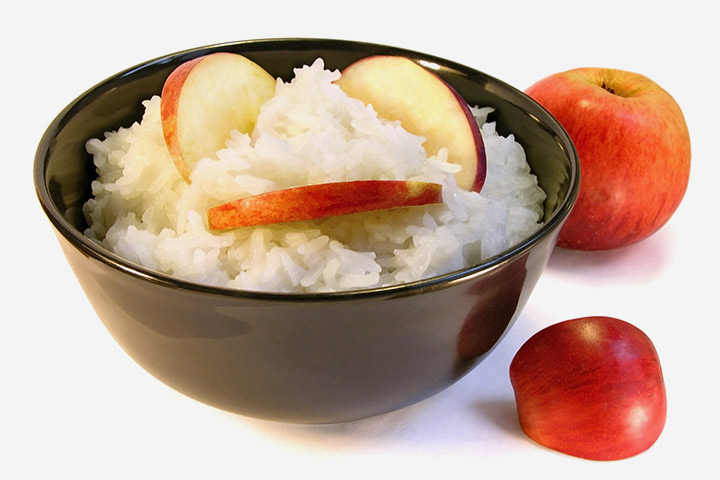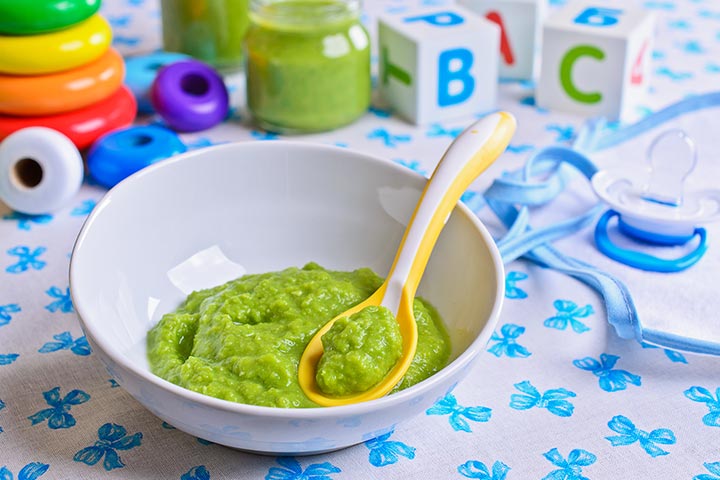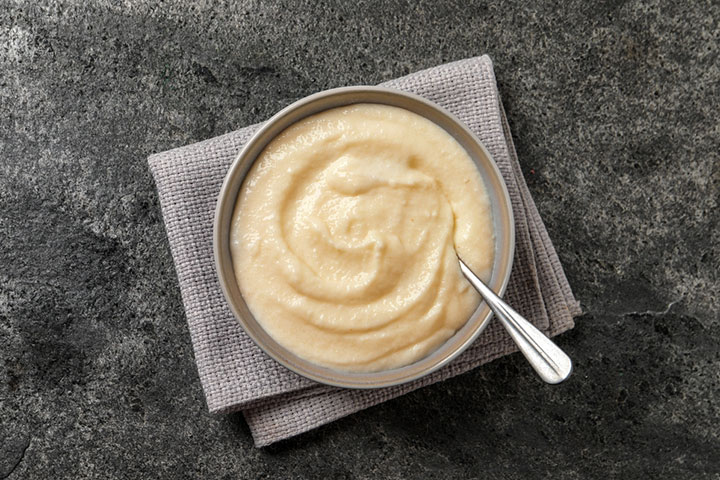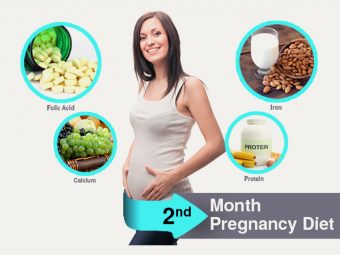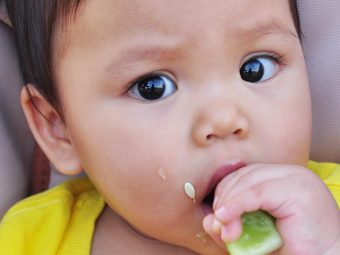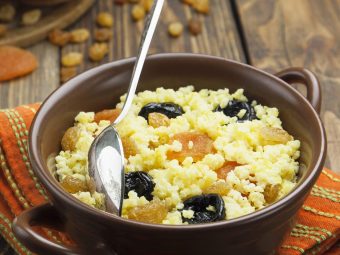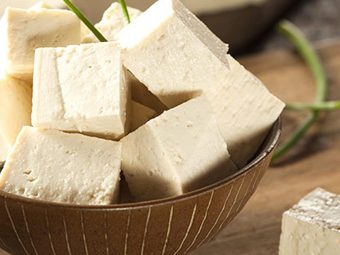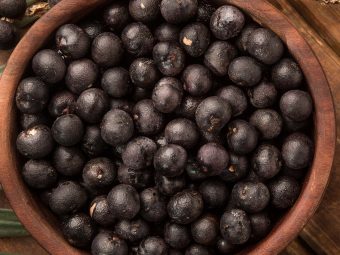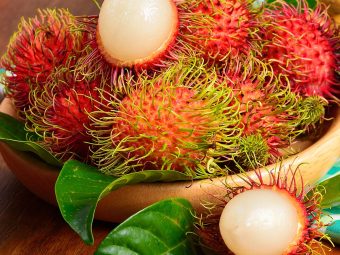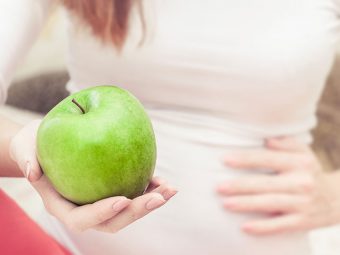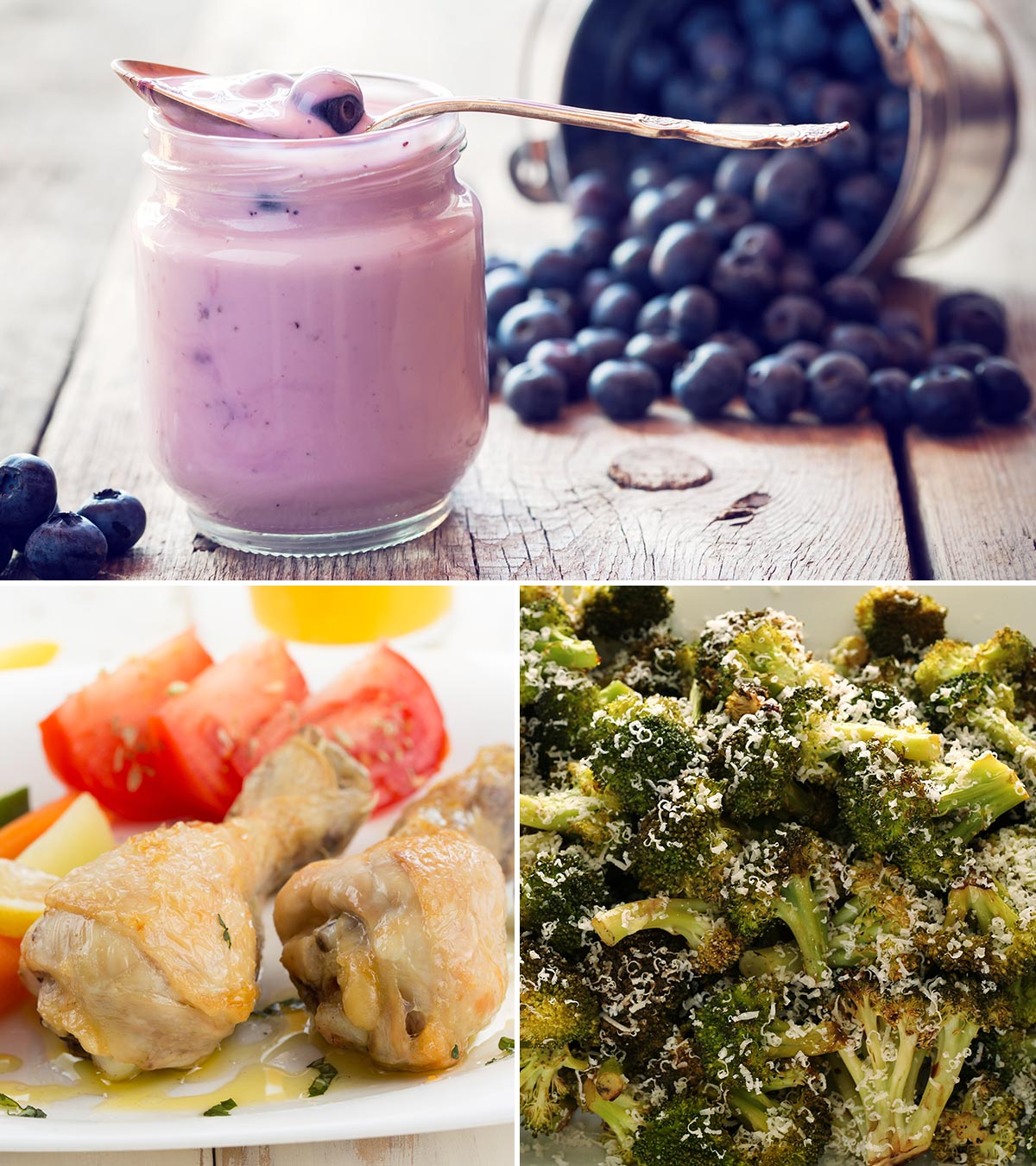
Image: Shutterstock
11-month-old baby food may contain a variety of options, as when children start nearing the age of one, their activities increase. To help them stay energetic and give them complete nutrition, you need to introduce them to various food options such as vegetables, fruits, grains, meat, and eggs.
However, it is important to introduce new foods slowly to babies to prevent any risk of allergies. Moreover, 11-month babies may also start showing interest in eating independently. However, while allowing this pleasure to them, you must be careful about choking hazards.
This post is a complete guide on the best foods you can give to an 11-month baby and what you should be careful about. It also provides you with a food chart and some interesting recipes.
What Can A Baby Eat At 11 Months Of Age?
A baby can eat nearly all foods from various food categories at the age of 11 months.
- Babies can eat almost all fruits after six months of age (1). This is crucial for the wholesomeness of the diet. As a mother, you would want to be cautious for an allergic reaction of citrus fruits. Hence, always introduce one citrus fruit at a time. The quantity introduced should be small, such as one or two teaspoons a day. Check for any symptoms of allergy. If there are no such signs, the fruit can be a part of the diet on a regular basis. Always wait for 3-5 days in between introducing a new food (2).
- Dairy products that an 11-month-old can have include yogurt. However, you must wait for them to complete 12 months before introducing cow milk (3).
- Nearly all vegetables can be given to 11-month-old babies. A few exceptions are tomatoes, raw carrots, and celery that should be given after the age of 12 months (4).
- All grains and cereals can be used to make cereals for babies.
- All types of meat and poultry can be given, but egg should be given only after the child is a year old (5).
To ensure adequate nutrition for the child, it is also essential to know the right quantities of these foods to serve the baby.
Rebekah, a mother to the lovely daughter Lindsey, shares the foods her daughter adored at 11 months old. She says, “Lindsey loves grapes – we quarter them for her and she has never had any choking issues with them. She eats most fruit but doesn’t seem to like strawberries. I haven’t tried oranges yet, and have only given her a few very small pieces of apple. Sometimes I steam a few pieces of apple and let her have those.
“When it comes to vegetables, carrots, peas, green beans, and corn usually go over fine with her, though I need to make a point to incorporate other veggies too and get her used to squash, zucchini, broccoli, cauliflower, etc. too. We’re going to work on that more. Lindsey likes certain proteins sometimes (cooked chicken, cooked ground turkey, pot roast) and then other times she chews it and spits it back out. It’s hit or miss with her for sure (i).”
 Quick tip
Quick tipHow Much To Feed An 11-month-old?
An 11-month-old can have half-a-cup of solid food, three to four times a day (7). It is the minimum quantity that your baby can eat during mealtime. You can give a healthy snack or two between the main meals namely breakfast, lunch, and dinner. The meals (including the baby snack ideas) should be an assortment of various foods to provide optimum nourishment to the baby.
You must continue giving breast milk or formula to the baby besides giving them solid foods. An 11-month-old baby usually breastfeeds four times a day (8). Make a diet keeping that in mind, to ensure both breastfeeding and solid foods contribute to the baby’s nutrition.
11-month-old Baby Food Chart
Here is a sample 11-month-baby’s food chart to maintain a proper feeding schedule, as recommended by pediatricians (9). Note that the plan includes all food types including breast milk and formula:
| Name of the meal | Food items |
|---|---|
| Breakfast | 1/4 – 1/2 cup of baby cereal 1/4 – 1/2 cup pureed fruit 4 – 6oz (118 – 177ml) formula or breastmilk |
| Snack | 4 – 6oz (118 – 177ml) formula or breastmilk 1/4 cup boiled vegetable finger food |
| Lunch | 1/4 – 1/2 cup yogurt or meat or cottage cheese 1/4 – 1/2 cup yellow or orange vegetables 4 – 6oz (118 – 177ml) formula or breastmilk |
| Evening snack | 1 cracker or teething biscuit 1/4 diced fruits or cheese or boiled vegetable finger food |
| Dinner | 1/4 cup diced meat or tofu 1/4 – 1/2 cup cooked green vegetables 1/4 cup of diced or pureed fruit |
| Before bedtime | 6 – 8oz (177 – 236ml) formula or breastmilk, followed by a small cup of water. |
Ensure that you brush the baby’s teeth before you put them to bed.
Note: If you still breastfeed your 11-month-old, then there can be on-demand breastfeeds between the balanced baby meals. The Pan American Health Organization (PAHO) notes that continued breastfeeding can help lower the risk of overweight/obesity in children by 13%.
Next, we give you seven recipes that you can try making for your baby. These recipes include nutritious vegetables and fruits to meet essential nutrient requirements, such as baby protein sources and healthy fat for babies.
8 Food Recipes For 11-Month-Old Babies
1. Chicken and carrots finger food
You will need:
- 1/2 cup diced carrot
- 1/2 boneless chicken cubes
- 4 cups of water
How to:
- Boil the carrot and chicken on a medium flame for about 25 minutes. You can cook them further if your baby prefers them soft.
- Once done cooking, sieve out the carrots and chicken. Do not discard the broth since you can use it for cooking other items.
- Cool the vegetables and then serve it as finger food to the 11-month-old baby.
 Quick tip
Quick tip2. Butternut squash and sweet potato
You will need:
- 1 cup sliced sweet potatoes
- 1 cup sliced butternut squash
- 1 cup of water
How to:
- Put the sweet potatoes and squash in a cooking vessel and boil them for 20 minutes on full flame.
- You can consider cooking them in a pressure cooker if your baby loves them extra soft. Put the vegetables in a pressure cooker, fill it half with water, and cook on high flame for one whistle. After the whistle, turn the flame to medium and cook for nine minutes.
- You can shallow fry the boiled potatoes and squash. Use a one-third teaspoon of 100% rice bran oil on a pan and shallow fry the boiled vegetables till they are tender. Cool and serve.
3. Broccoli and cottage cheese
You will need:
- 1 cup of large broccoli florets
- 1 cup of large cottage cheese chunks
- 2 1/2 cups of water
- 1/2 teaspoon 100% rice bran oil
How to:
- Boil the broccoli for eight minutes or more if your baby loves them tender.
- Heat oil in a cooking pan. Put the cottage cheese chunks, and shallow fry them till they turn a light brown color.
- Next put the broccoli and shallow fry it with the cottage cheese for a couple of minutes. Cool and serve it to the baby.
 Quick tip
Quick tip4. Banana and oats porridge
You will need:
- 1 cup oats flour
- 1 banana
- 2 cups of water
How to:
- Put the oats and water in a cooking vessel. Bring the water to boil and turn the flame to simmer. Cook the oats, while stirring it, for five minutes.
- Chop the banana into small pieces and mash it in a bowl.
- Let the cooked oats cool for a few minutes. Add the mashed banana and stir it well. Serve it to the baby.
5. Blueberry yogurt
You will need:
- 1 cup blueberries
- 1 cup plain yogurt
How to:
- Put the blueberries and yogurt into a blender.
- Blend till the blueberries mix well with the yogurt.
- You can serve the yogurt as it is or with a cracker.
6. Rice and apple
You will need:
- 1 cup rice
- 1 whole apple
- 3-4 cups of water
How to:
- Remove the skin of the apple and chop it into small pieces.
- Steam the apples using a vegetable/fruit steamer for three to five minutes.
- Boil the rice till tender.
- Mix the rice and steamed apples in a bowl. Mash them till they are soft and mixed well.
7. Green bean and avocado mash
You will need:
- 1 cup chopped green beans
- 1 avocado
- 2-3 cups of water
How to:
- Trim the ends of the green beans and cut them from the middle.
- Put the chopped beans into a cooking vessel and boil for 7-10 minutes.
- Scoop out the pulp from the avocado and transfer it into a blender. Add the boiled green beans as well. Blend till mixed consistently and feed the baby.
8. Semolina pudding/halwa
Image: Shutterstock
You will need:
- ¼ cup semolina
- 2 dry apricots (chopped into small pieces)
- ½ -1 cup water
- 1/5tsp cardamom powder
- 1/2tsp honey
- Pinch of cinnamon powder
How to:
- In a pan, roast semolina until it turns light golden brown. Keep it aside.
- Bring the water to boil in another pan and add the roasted semolina and apricot pieces. Cook on a low flame until you get a porridge-like consistency. Add more water if needed.
- Add honey and cinnamon powder, and give everything a good stir. Serve it warm.
Tips For Feeding A 11-month-old
- Work with an assortment of recipes: Alternate the recipes such that the infant gets all types of foods that supply the essential nutrients for healthy growth and for reaching their developmental milestones. Fruits and vegetable purees for babies are also an effective way to make your baby eat a nutritious meal. A balanced diet is vital to help the infant grow better.
- Do not add salt: A baby only needs 0.4 g of sodium per day, up to the age of 12 months (10). Eleven-month-old babies will get all the sodium they need from formula and breast milk, as well as from the Vegetables and fruits for babies that you offer. Avoid adding excess salt to the food and always check for salt content of various foods before giving them to the baby.
- Never give fruit juice: The American Academy of Pediatrics recommends no fruit juice for children below the age of 12 months, as it offers no nutrition whatsoever (11).
 Caution
CautionFrequently Asked Questions
1. What should my 11-month-old avoid eating?
You should avoid giving honey, whole nuts, raw or partially cooked eggs, raw shellfish, and too much salt and sugar to your 11-month-old (13).
2. How much water can I give to my 11-month-old?
You may give a baby younger than 12 months about eight ounces of water a day (14). It is advisable, though, that the baby gets most of their water intake from breast milk.
3. What are some signs that an 11-month-old baby is ready to start eating more solid foods?
Babies typically may start eating solid food by six months of age; hence at 11 months, they are likely enjoying different types of foods. Some signs that you can increase their consumption of solid food include cues such as the baby still feeling hungry after consuming their regular meal portions, showing interest in what you consume, and readily opening its mouth when spoon-feeding the child (15).
An 11-month baby’s food can include almost everything the family eats. With continued breastfeeding, they can consume one-fourth to half a cup of well-cooked, healthy foods, such as whole grains, tofu, beef, chicken, dairy, fruits, and veggies, three to four times a day. Besides breakfast, lunch, and dinner, include a one-time snack in the meal planning to get sufficient energy to make it through the day. Encourage them to self-feed if they show interest in eating independently. However, be watchful to help prevent the choking risk.
Infographic: What Can A Baby Eat At 11 Months?
At 11 months, a baby can eat a variety of foods. However, it’s essential to consult their doctor before introducing new foods to ensure that they get the nutrients they need. Refer to the following infographic for a list of safe and nutritious options for your little one. Illustration: Momjunction Design Team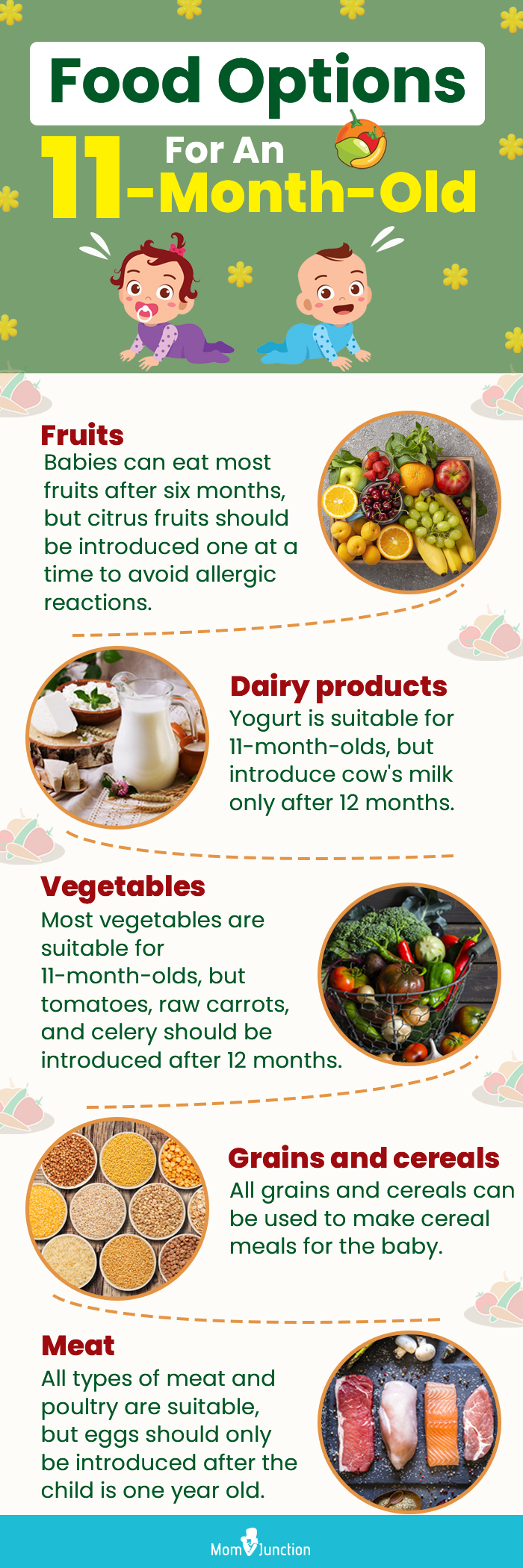
Key Pointers
- There should be a variety of healthy foods available for children that are appropriate for their age.
- Children should be taught self-feeding habits to promote independence.
- The diet should include sufficient amounts of iron and calcium enriched foods.
- Introducing new foods periodically can help parents identify potential allergies in their children.
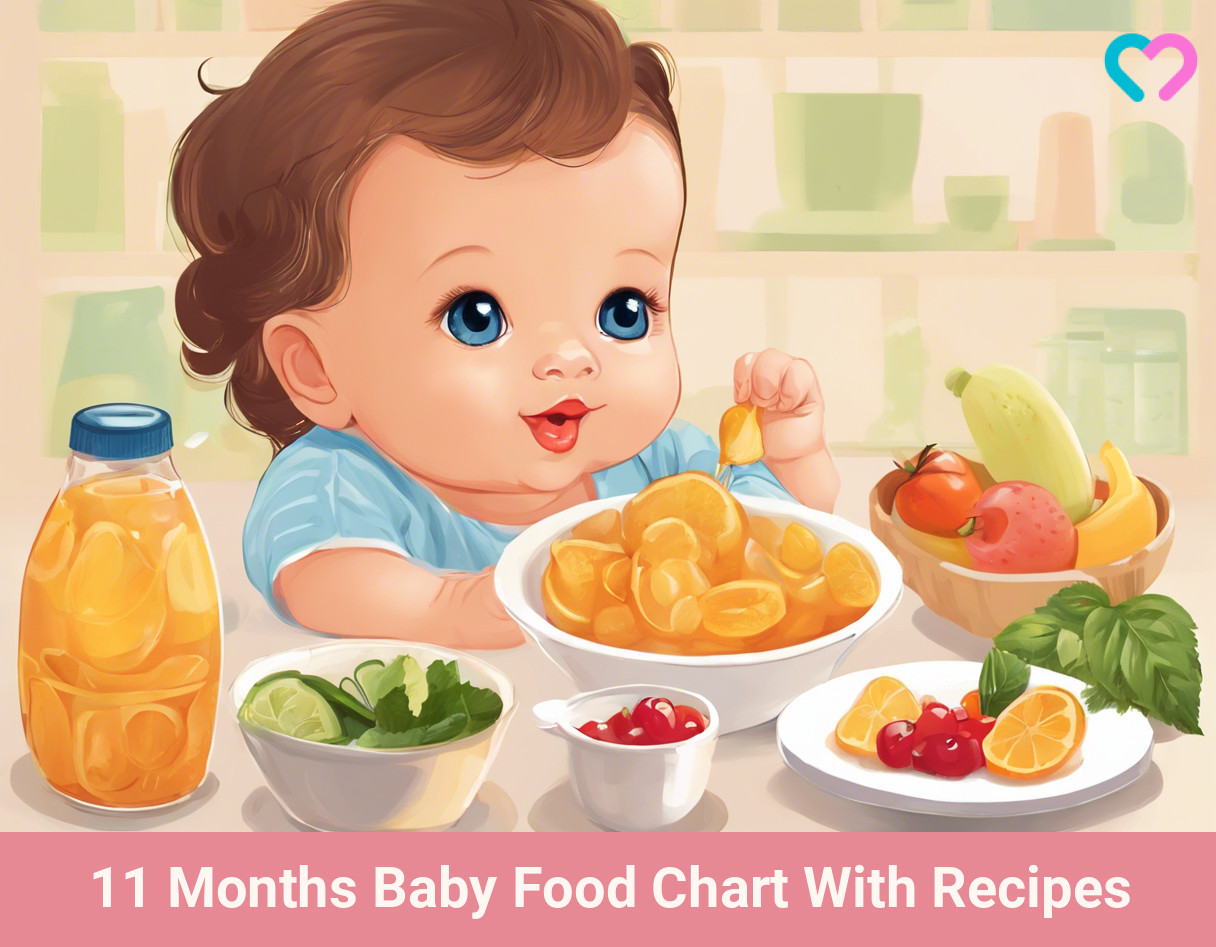
Image: Stable Diffusion/MomJunction Design Team
Personal Experience: Source
MomJunction articles include first-hand experiences to provide you with better insights through real-life narratives. Here are the sources of personal accounts referenced in this article.
i. Finger Foods for an 11-Month-Old – Meal Ideas;https://rebekahrose.blogspot.com/2014/09/finger-foods-for-11-month-old-meal-ideas.html
References
1. Foods and drinks to encourage; Centres for Disease Control and Prevention
2. Feeding Guide for the First Year; Stanford Children’s Health
3. Why Formula Instead of Cow’s Milk?; American Academy of Pediatrics
4. Introducing Solid Foods to Infants; Colorado State University
5. Feeding Guide for the First Year; Driscoll Children’s Hospital
6. When, What, and How to Introduce Solid Foods; Centres for Disease Control and Prevention
7. Feeding your baby: 6–12 months; UNICEF
8. The First 12 Months: What & When to Feed Your Baby; UC Davis Children’s Hospital
9. Sample Menu for an 8 to 12 Month Old; American Academy of Pediatrics
10. How much salt do babies and children need?; NHS UK
11. AAP Recommendation on Fruit Juice; American Academy of Pediatrics
12. Foods and Drinks to Avoid or Limit; Centres for Disease Control and Prevention
13. Foods to avoid giving babies and young children; NHS
14. Choose Water for Healthy Hydration; Healthy Children; AAP
15. ; Cleveland Clinic





